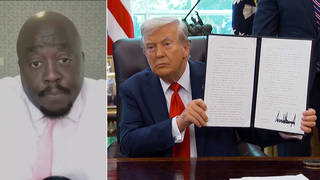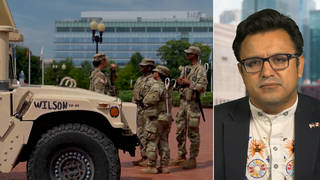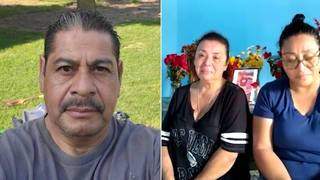This content originally appeared on Democracy Now! and was authored by Democracy Now!.
This post was originally published on Radio Free.
This content originally appeared on Democracy Now! and was authored by Democracy Now!.
This post was originally published on Radio Free.
This content originally appeared on Democracy Now! and was authored by Democracy Now!.
This post was originally published on Radio Free.
This content originally appeared on Democracy Now! and was authored by Democracy Now!.
This post was originally published on Radio Free.
This content originally appeared on Democracy Now! and was authored by Democracy Now!.
This post was originally published on Radio Free.
This content originally appeared on Democracy Now! and was authored by Democracy Now!.
This post was originally published on Radio Free.
This content originally appeared on Democracy Now! and was authored by Democracy Now!.
This post was originally published on Radio Free.

Among the executive orders President Trump signed Monday are two that aim to eliminate so-called cashless bail. The move threatens to cut federal funding to Washington, D.C., as well as other cities and jurisdictions that continue to implement the economic and racial justice policy. Before cash bail was eliminated, “judges would come up with a number out of thin air, and the decision about whether somebody was released was based upon whether they had a rich grandma or rich aunt or a girlfriend who was willing to put up the money,” says Sharone Mitchell, chief of the Law Office of the Cook County Public Defender.
This comes as Trump has continued to single out D.C., as well as Democratic-led cities like Chicago, engaging in racist and baseless rants about a violent crime wave as he threatens to expand his military occupation. “I’m a lawyer. I would tell you lots of legal arguments. I’m not sure the law matters anymore,” says Mitchell.
This content originally appeared on Democracy Now! and was authored by Democracy Now!.
This post was originally published on Radio Free.

President Donald Trump signed an executive order Monday that would establish “specialized” National Guard units to be quickly deployed in Washington, D.C., and all 50 states, and again threatened to send troops to Democrat-run cities like Chicago. Officials and grassroots organizers have vowed to fight back. “We are a strong labor city,” says Byron Sigcho-Lopez, a Democratic Socialist alderperson of the 25th Ward in Chicago. “We’re not going to normalize fascism, and we’re prepared to face the dictator head-on.” Sigcho-Lopez says the city is planning a mass mobilization effort to take place on Labor Day.
This content originally appeared on Democracy Now! and was authored by Democracy Now!.
This post was originally published on Radio Free.
This content originally appeared on Democracy Now! and was authored by Democracy Now!.
This post was originally published on Radio Free.
This content originally appeared on Democracy Now! and was authored by Democracy Now!.
This post was originally published on Radio Free.
This content originally appeared on Democracy Now! and was authored by Democracy Now!.
This post was originally published on Radio Free.
This content originally appeared on Democracy Now! and was authored by Democracy Now!.
This post was originally published on Radio Free.
This content originally appeared on Democracy Now! and was authored by Democracy Now!.
This post was originally published on Radio Free.
This content originally appeared on Democracy Now! and was authored by Democracy Now!.
This post was originally published on Radio Free.
This content originally appeared on Democracy Now! and was authored by Democracy Now!.
This post was originally published on Radio Free.
This content originally appeared on Democracy Now! and was authored by Democracy Now!.
This post was originally published on Radio Free.

Family and community members are mourning 52-year-old Roberto Carlos Montoya Valdez, a father and grandfather from Guatemala who died while attempting to escape an anti-immigrant raid at a Home Depot in California last week. Montoya, a day laborer who had lived and worked in the United States for about three years, was struck and killed by a car while fleeing across a nearby freeway. Democracy Now! speaks with Montoya’s wife and daughter, Ana María Vásquez and Ana Victoria Montoya, at their home in Guatemala. “We want people to remember my dad in the same way we will remember him: as a loving, respectful, brave man,” says Ana Victoria. “He died because of these injustices, this persecution.”
At least two men have now died while attempting to flee the Trump administration’s massive expansion of federal immigration enforcement. Authorities have yet to confirm which agencies or groups were behind the raid. “If it was indeed a fact that Roberto Carlos was being chased by an individual into the highway, the community, the family, needs to know the truth. We need to, most of all, bring justice,” says Pablo Alvarado, the co-executive director of the National Day Laborer Organizing Network. NDLON is calling on Home Depot to release any video footage it has, and demanding an immediate and full investigation of the events that led to Montoya’s death.
This content originally appeared on Democracy Now! and was authored by Democracy Now!.
This post was originally published on Radio Free.

Shahed Ghoreishi was fired from his position as a press officer for Israeli-Palestinian affairs at the U.S. State Department earlier this week. While no official explanation was given, Ghoreishi was involved in multiple departmental disputes over how to characterize U.S. positions on Israel’s forced expulsion of Palestinians from Gaza and the killings of Palestinian journalists. In a TV broadcast exclusive, Ghoreishi speaks to Democracy Now! about his firing and what it may tell us about the Trump administration’s future policy in Israel and Palestine.
This content originally appeared on Democracy Now! and was authored by Democracy Now!.
This post was originally published on Radio Free.

Shahed Ghoreishi was fired from his position as a press officer for Israeli-Palestinian affairs at the U.S. State Department earlier this week. While no official explanation was given, Ghoreishi was involved in multiple departmental disputes over how to characterize U.S. positions on Israel’s forced expulsion of Palestinians from Gaza and the killings of Palestinian journalists. In a TV broadcast exclusive, Ghoreishi speaks to Democracy Now! about his firing and what it may tell us about the Trump administration’s future policy in Israel and Palestine.
This content originally appeared on Democracy Now! and was authored by Democracy Now!.
This post was originally published on Radio Free.

Democrats and Republicans are locked in a historic battle over congressional representation as Texas Republicans gerrymander the state’s district maps to flip five Democratic seats, at the request of President Trump. California Governor Gavin Newsom says he is fighting “fire with fire,” signing legislation to hold special elections for the public to approve a new gerrymandered map of their own. David Daley, a voting rights expert and the author of Antidemocratic: Inside the Right’s 50-Year Plot to Control American Elections, calls this a “gerrymandering Armageddon” that threatens to spread nationwide. “Donald Trump does not want to have an election fair and square,” says Texas state legislator Trey Martinez Fischer, a Democrat representing San Antonio. “He wants to be the 'commander-in-cheat.' He wants to cheat on America, cheat on democracy, steal these congressional seats.”
This content originally appeared on Democracy Now! and was authored by Democracy Now!.
This post was originally published on Radio Free.
This content originally appeared on Democracy Now! Audio and was authored by Democracy Now!.
This post was originally published on Radio Free.
Democracy Now! Friday, August 22, 2025
This content originally appeared on Democracy Now! Audio and was authored by Democracy Now!.
This post was originally published on Radio Free.
Democracy Now! Friday, August 22, 2025
This content originally appeared on Democracy Now! Audio and was authored by Democracy Now!.
This post was originally published on Radio Free.
This content originally appeared on Democracy Now! and was authored by Democracy Now!.
This post was originally published on Radio Free.
This content originally appeared on Democracy Now! for Broadcasters – HD MP4 and was authored by Democracy Now! for Broadcasters – HD MP4.
This post was originally published on Radio Free.
This content originally appeared on Democracy Now! for Broadcasters – HD MP4 and was authored by Democracy Now! for Broadcasters – HD MP4.
This post was originally published on Radio Free.
This content originally appeared on Democracy Now! for Broadcasters – HD MP4 and was authored by Democracy Now! for Broadcasters – HD MP4.
This post was originally published on Radio Free.
This content originally appeared on Democracy Now! and was authored by Democracy Now!.
This post was originally published on Radio Free.